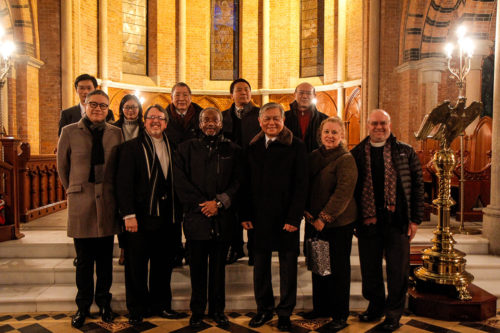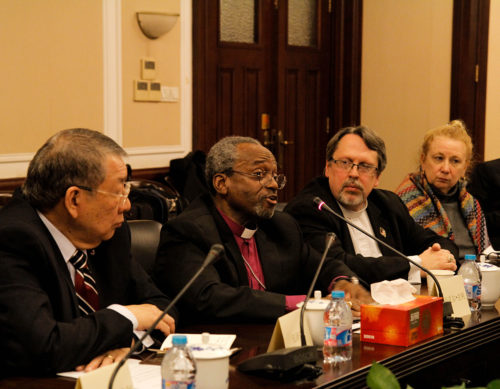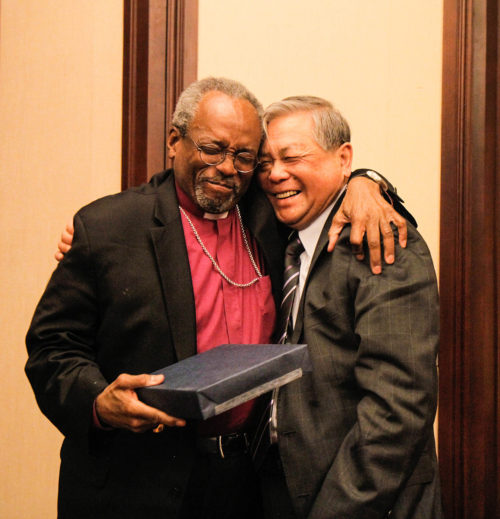Episcopal, Chinese church relationship strengthened through visitPosted Mar 6, 2017 |
|

Episcopal Presiding Bishop Michael Curry and Minister Wang Zuo’an of the State Administration for Religious Affairs and their staffs posed for a photograph on at SARA’s headquarters following a Feb. 21 meeting in Beijing. Photo: Lynette Wilson/Episcopal News Service
[Episcopal News Service – Beijing and Shanghai] It was building friendships and strengthening relationships that characterized the Most Rev. Michael Curry’s first official visit as presiding bishop and primate to Asia and Southeast Asia last month, including in China where he and his staff met with government officials and leaders of the Protestant Christian Church.
“At its root, the Christian way is a way of relationship in Christ. Jesus said wherever two or three gather together in my name, there I am,” said Curry, in an interview with Episcopal News Service in Shanghai, when asked why it’s important for the Episcopal Church to maintain close ties with China.
“The New Testament talks about the body of Christ, not the individuals of Christ. When we talk about being one holy catholic and apostolic church [we talk about] a worldwide network of people who are committed to and in relationship with Jesus Christ and therefore, through him, with each other.”
During a February visit to Asia and Southeast Asia to visit Anglican Communion provincial churches and Episcopal Diocese of Taiwan, Curry visited China at the invitation of the China Christian Council (CCC) and the Three-Self Patriotic Movement (TSPM). He attended meetings in Beijing and Shanghai, where he met with the minister of the State Administration for Religious Affairs (SARA), the Chinese government agency that oversees religious practice, and CCC/TSPM leaders, including Elder Fu Xianwei.
Peter Ng, the Episcopal Church’s officer for Asia and the Pacific, now retired; the Rev. Charles Robertson, canon to the presiding bishop for ministry beyond The Episcopal Church; the Rev. David Copley, director of global partnerships and mission personnel; Neva Rae Fox, the church’s public affairs officer; and Sharon Jones, executive assistant to the presiding bishop, accompanied Curry on the Feb. 15-27 trip that also included stops in the Philippines, Hong Kong and Taiwan.
The CCC and TSPM form the official, government-sanctioned Protestant church in China. “Three-Self” stands for self-governing, self-supporting and self-propagating; TSPM serves as a liaison between churches and government, while CCC focuses on church affairs.
SARA serves as a bridge between religion and the central government and coordinates relationships among religions to make them all equal. Besides overseeing the TSPM, SARA also oversees an additional four sanctioned religious groups: Muslims, Roman Catholics, Buddhists and Taoists.
During a Feb. 21 meeting at SARA’s headquarters in Beijing, Minister Wang Zuo’an said maintaining “religious harmony” as religion grows is one his department’s priorities.

Episcopal Church Presiding Bishop Michael Curry and Elder Fu Xianwei and their staffs posed for a photograph Feb. 22 in the former Holy Trinity Anglican Cathedral on the campus of the National Office of China Christian Council and the Three-Self Patriotic Movement in Shanghai, China. Photo: Lynette Wilson/Episcopal News Service
Modern mainland China has no history of religious conflict; politics and religion have been kept separate, and no one religion has been “more powerful” than another, explained Wang. In today’s world, with its increased focused on nationalism, increasing competition for resources, religious conflict and extremism, “how they can stay in harmony and work together is a big challenge,” he said, speaking in Mandarin through an interpreter.
Another challenge, said Wang, is the U.S. government’s inclusion of China as a “special attention” country in an annual report on International Religious Freedom.
“I sincerely hope the presiding bishop could use his influence to make a positive push for constructive dialogue between the two governments,” he said.
Wang also cited concern over an executive order on “religious freedom” expected from President Donald Trump’s administration.
“China and U.S. relations are going from good to bad, and this matters to the whole world,” said Wang, adding that while it’s expected that countries the size of the United States and China will have differences, they should also engage on issues of common interest. He cited religion as a potential issue of common interest, not a divisive issue.
“We should take religion as a good thing for our two countries, not a problem,” he said, adding differences concerning religion preceded the Trump administration. It’s also his sincere hope, he added, that the churches “can have a normal, healthy relationship.”
Curry responded with a promise that the Episcopal Church and the CCC/TSPM would remain strong and that the two churches would continue to work together.
“My conviction for us to continue to live together when Clinton, Bush and Obama were president, and it is still true with President Trump,” said Curry, during the Feb. 21 meeting. “We’re going to work so that we can live and work together.
“Your words,” he said to Wang, “speak to my heart and what I believe. I thank you for sharing honestly.” To which Wang replied, “it’s only through conversation that we can understand each other better. I appreciate that you said no matter who the president is, our relationship will not change.”

Elder Fu Xianwei, chair of the National Committee of the Three-Self Patriotic Movement of the Protestant Churches in China, addressed Presiding Bishop Michael Curry and his staff during a Feb. 22 meeting at the National Office of China Christian Council and the Three-Self Patriotic Movement in Shanghai, China. To Fu’s left are Gu Mengfei, TSPM’s associate secretary general and director of the CCC’s research department, and Elder Ou Enlin, director of overseas relations for the CCC/TSPM. Photo: Lynette Wilson/Episcopal News Service
Christianity is growing faster than seminaries can train theologians, said Wang, and it’s in that respect that the Protestant Christian Church in China needs continued support from the Episcopal Church.
In a country of 1.4 billion people, the number of Protestant Christians has grown an average 10 percent annually in China since 1979. Though Chinese Christians are “post-denomination,” they still identify as Protestants and Roman Catholics, the latter of which the government’s Chinese Patriotic Catholic Association, not the pope, is the supreme authority.
Christianity first reached mainland China in the seventh century during the Tang dynasty but didn’t begin to flourish until the 19th century. In 1949, Mao Zedong banned the religion. It didn’t resurge until after his death in 1976 and the end of the Cultural Revolution. Now, with the communist central government’s sanction and oversight, Protestant Christianity is on the rise.
For example, explained Fu of the CCC, the Protestant Christian church baptizes between 400,000 and 500,000 new believers annually; there are approximately 60,000 congregations served by 57,000 pastors (an average of one pastor per 700 members) and 200,000 lay leaders. And in recent years, the church has attracted professionals, doctors and lawyers, which has led to a demand for higher quality pastoral care.
Even though the church is nondenominational, the liturgy reflects influences from Anglican to Seventh-day Adventist, said Fu.

Episcopal Presiding Bishop Michael Curry addressed Elder Fu Xianwei, chair of the National Committee of the Three-Self Patriotic Movement of the Protestant Churches in China, and his staff during a Feb. 22 meeting at the National Office of China Christian Council and the Three-Self Patriotic Movement in Shanghai, China. To Curry’s left is Peter Ng, The Episcopal Church’s officer for Asia and the Pacific, now retired, and to his right is the Rev. Charles Robertson, canon to the presiding bishop for ministry beyond The Episcopal Church; and Neva Rae Fox, the church’s public affairs officer. Photo: Lynette Wilson/Episcopal News Service
The Episcopal Church’s and the Chinese church’s relationship started with Bishop K.H. Ting, who trained in the Anglican tradition at Union Theological Seminary in New York, served as long-time principal of the board of directors of Nanjing Union Theological Seminary, and in 1955 became the bishop of Zhejiang until the Cultural Revolution. In 1980, he became the president of the CCC; in 1985, he helped found the Amity Foundation, one of the first nongovernmental organizations and the first faith-based one established to address society’s social needs. The foundation also includes Amity Printing Co., which prints 4 million copies of the Bible and various spiritual and devotional books annually.
Despite changes in religious practice since the opening of China, some people still default to the Cold-War narrative.
“Americans remember Christians smuggling Bibles into China and behind the Iron Curtain in Eastern Europe … all of that was a story at one time. Now they’re printing more Bibles in China than probably anywhere else in the world,” said Curry. “At Amity, they are printing Bibles and religious literature to teach and educate and form their folk; it’s extraordinary.”
Christians in the United States could learn a lot about evangelism from Christians in China, he added.
“Bishop Ting helped Christians learn to be faithful to the gospel and authentically indigenous to China, and China as it was emerging. Now what that meant was that he helped the Chinese Church become authentically Christian and authentically Chinese. Bishop Ting is revered and respected as one of the leaders in Chinese Christianity. He clearly believed in evangelism, and he believed in Chinese evangelism, in their way, not a Western cultural way.
“Part of what we sometimes struggle within the United States, from my perspective, is a kind of evangelism that is less about a relationship with Jesus of Nazareth that you find in the New Testament, and more about being part of American culture or a set of preconceived ideas that are imposed upon Christianity that aren’t necessarily what Jesus of Nazareth was talking about,” Curry continued. “He (Ting) has shown us a way to get people into an authentic relationship with Jesus of Nazareth. That is a way of evangelism; it seems to me, and (an) Anglican way of evangelism.”
Since the United Kingdom’s 1997 handover of Hong Kong to China, the Anglican Province of Hong Kong, Sheng Kung Hui, has worked to strengthen relationships with Protestant Christians on the mainland and has worked with the Episcopal Church to strengthen its relationship with Protestant Christians in China, said Robertson, the presiding bishop’s canon for ministry beyond the Episcopal Church.
The Chinese church receives support from the Anglican Province of Hong Kong, which has helped to train the faculty at the seminary in Nanjing, whose students have studied in Hong Kong.
That relationship continues, said the Rev. Peter Koon, provincial secretary of the Anglican Province of Hong Kong.

Episcopal Church Presiding Bishop Michael Curry and Elder Fu Xianwei, chair of the National Committee of the Three-Self Patriotic Movement of the Protestant Churches in China, embraced following a gift exchange during a meeting Feb. 22 at the National Office of China Christian Council and the Three-Self Patriotic Movement in Shanghai, China. Photo: Lynette Wilson/Episcopal News Service
“The church in Hong Kong is providing anything they need: resources and training and relationship,” said Koon, in an interview with ENS in Shanghai. “The Episcopal Church can provide theological training and support for social welfare projects … they need friends to understand what they are doing and support them.”
In his meetings and a dinner with the leadership of the CCC and the TSPM, Curry assured Fu and others that he would continue to work with them, just as his predecessor the Most Rev. Katharine Jefferts Schori did when she visited China in 2012. As for Curry and Fu, who attended Curry’s installation as presiding bishop in November 2015, the two related as old friends.
“Christianity here is vibrant, it is alive, it is really alive, and these are our brothers and sisters,” said Curry. “And we use the language of partnership, but more than partnership, a genuine friendship. And we sing that hymn, ‘In Christ, there is no East or West,’ and in Christ, there really isn’t.”
– Lynette Wilson is an editor and reporter for Episcopal News Service.

Social Menu